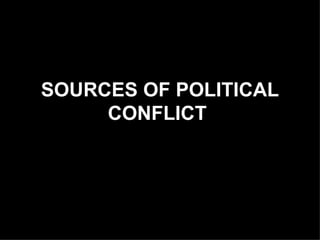Sources Of Political Conflict
- 1. SOURCES OF POLITICAL CONFLICT
- 2. Focus: Power Resources Social Identity Ideas Values
- 3. On Power… Centers on 2 things: - domination - influence * the question of who has power in society becomes a question of who has political power
- 4. A pervasive control of the government is an exercise of political dominance ( domination ) examples : masters dominating slaves, aristocrats dominating commoners, rich dominating the poor…in history in different countries, religious hierarchy, upper class, and political party have exercised dominance over the government
- 5. Domination is the predominant mode of political power in authoritarian regimes Here the political clique (group) monopolizes governmental authority and imposes its will on the population.
- 6. Influence is the predominant mode of exercising political power in democracies Where the government plays a mediating role, society’s main groups such as business, labor, middle class, religious groups, ethnic groups, etc. may influence the government to help them out or favor them….
- 7. Methods used to exercise influence: - personal persuasion (ex.Church on RH Bill) - public demonstration (ex. prayer rally against BJE) - campaign contributions (ex.Chinese chamber of commerce funding campaign of a certain politician) - votes on election day -bribery and etc.
- 8. On Resources… Land Natural resources ( oil, petroleum reserves etc.) Money ( budget, policies on econ growth etc.) - These are typically economic conflicts
- 9. To help us understand the relationship of economics and politics… Political Economy This allows students to look into questions in which various resources are dealt with through political process.
- 10. Such questions as : Labor-management relations Class conflict involving the rich and poor and those in between Government policies on economic growth,taxes, inflation, interest rates,minimum wage etc.
- 11. In democracies: - private enterprises are given more latitude ( theorist say they are essential in democracy because economic freedom promote political freedom ) - governments also play a major role in national economy ( raising taxes, regulating private businesses, and actually owning corporations )
- 12. In authoritarian regimes: - prone to restrict freedom of private enterprise -control over the country’s population requires control of its economy -in an extreme case, gov may control and operate the entire economy ( centrally planned economy , i.e. USSR ) -in other cases enterprises are allowed but under the watchful eye of the government ( China in the 1980s, Nazi, etc.)
- 13. One of the most important questions in comparative politics centers on the relationship between States and Markets
- 14. On Social Identity… This refers to the ways in which individuals and groups are defined in society To better understand how comparative politics addresses social identity, the following issues need to be dealt with: - class, ethnicity, religion, gender, and generational identities
- 15. Class Usually refers to the economic position of individual or group in society… socioeconomic identity in other words
- 16. Ideas Socialism: - An ideology which central premise is that an economy based on private enterprise places excessive economic and political power in the hands of a small band of private entrepreneurs
- 17. - Maintain that humanity is better off if free-enterprise system were abolished all together -Socialist government to take over factories, banks,farms, etc….
- 18. Certain disagreements as to how ideals of Socialism should be practiced: Karl Marx- proposed no government a all; gov always agent of social domination -did not view socialism is authoritarian term but a liberating force that will free masses from economic exploitation
- 19. Soviet-style Communism: -believed in all powerful government operated by a well-organized communist party claiming to represent the workers - Stalin and Mao Ze Dong
- 20. Fascism: ideology that emerged in Europe in 1920s-1930s - most malignant manipulation was Hitler’s Nazi Movement which supreme political values were: 1. solidarity and strength of German Nation 2. extermination of non-Aryan race and the Jews
- 21. - In Italy , Benito Moussilini- emphasized national solidarity and pride…glorifying military and opposing democracy
- 22. Political ideology:left-right spectrum Radical left communism democracy Conservative authoritarian fascism
- 23. Values May be defined as spiritual/moral principles, ideals, or qualities of life that people favor for their own sake Most important values: -freedom -justice promotes human dignity and civilized relationship -equality -security -order -community
- 24. Values may become political when people call on government to guarantee them There can be conflict of values: -freedon vs. Equality -order vs. Freedom (dictatorial) (democracy)
- 25. Western value- west exultation of individual freedom which will lead ( according to criticisms) to social collapse/breakdown Asian value- individual responsibilities to collective community…intense family loyalty
- 26. * Democracy is not a recipe for eliminating conflict, rather it is a mechanism for dealing with it in accordance with generally accepted rules….

























